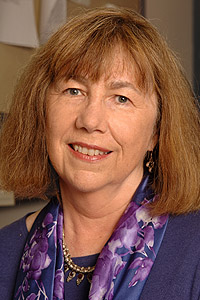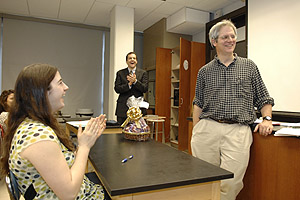Chicago in the News
The Chronicle’s biweekly column Chicago In the News offers a digest of commentary and quotations by a few of the University faculty members, students and alumni who have been headlining the news in recent weeks. Chicago faculty members are some of the most frequently quoted experts, so space allows publishing references to only selected examples.
To read many of the full newspaper articles mentioned in this column, visit the In the News column at the University News Office Web site: http://www-news.uchicago.edu/.
Doctors at boy’s side
Stories published in the Chicago Tribune and the Chicago Sun-Times quoted University doctors at the Comer Children’s Hospital who are caring for a 2-year-old patient with eczema vaccinatum. The child contracted the disease from his father who had been vaccinated for smallpox before leaving for Iraq. The Centers for Disease Control gave emergency permission for the hospital to administer an experimental drug, ST-246; the drug has been effective in treating animals infected with smallpox. Kenneth Alexander, Associate Professor of Infectious Diseases in Pediatrics, said in the Tribune story that the case is rare and something new to the team of doctors, who could not find any reported cases in the United States since before 1972, when smallpox vaccinations had ended. Madelyn Kahana, Professor and Section Chief of Critical Care Medicine in Pediatrics, said of the misstep in the military’s administering of the father’s vaccination: “I think the information simply wasn’t disseminated properly or impressed in a manner that was understood, because I don’t think anyone would knowingly expose their child to this.”
 Froma Walsh | |
Abuse feeds on fear of loss
Froma Walsh, the Mose and Sylvia Firestone Professor of Clinical Social Work in the School of Social Service Administration, provided her expertise for a column published in the Wednesday, March 21 Chicago Tribune. The columnist wrote about a recent case of child abuse in Chicago, which led to 5-year-old Melanie Beltran’s death by the hands of her mother. Walsh, who also is a faculty member in Psychiatry and is Co-Director of the Center for Family Health, explained why children keep secrets of abuse that is occurring in their homes. “Children can be incredibly loyal to their parents, even when they themselves have been abused. Partly, it’s the fear that they could lose that parent if the secret came out. Even when the parent has been abusive, the fear of loss can be traumatic. When they’ve witnessed abuse, there’s also the fear that the abuse could turn on them as well.” The column also quoted Julie Spielberger, a Research Fellow at the Chapin Hall Center for Children at the University.
Bulletin has shot at top title
The Bulletin of the Atomic Scientists, based at the University, is a finalist for a National Magazine Award for general excellence, and The New York Times published an article about the competition and the Bulletin’s shot at the title in its Thursday, March 15 edition. The article noted that the Bulletin received the award in 1987 for its single issue devoted to Chernobyl. The Times article quoted Mark Strauss, editor of the Bulletin, who said he and the magazine’s staff of one art director and four editors learned of the nomination Wednesday, March 14, and celebrated by “taking five minutes out to pat ourselves on the back” and then returned to putting out the next issue. “Deadlines wait for no one,” he said.
 Golden Apple teaching award winner David Derbes (at right) gets a round of applause from faculty and students at the University’s Laboratory High School. | |
Golden Apple goes to Lab teacher
David Derbes, a physics teacher at the University Laboratory High School, was photographed for an article published in the Thursday, March 15 Chicago Tribune, after winning a Golden Apple teaching award. Derbes was among nine Golden Apple teachers honored this year on Wednesday, March 14. The Apple Foundation, based in Chicago, gives the awards and rotates them among three categories of grade levels each year.
Corporate boards losing CEOs
Warren Batts, Adjunct Professor of Strategic Management in the Graduate School of Business, commented on the decrease in chief executive officers of companies serving on boards of other companies. Batts, who served on four corporate boards, while also serving as CEO of Premark until he retired in 1997, shared his experience and said that retired CEOs can be as effective as active CEOs who serve on corporate boards. “The boards I served on, it was still the retired CEOs who were the mainstays. They’d been there longer and they had more time to give to the problem. Anybody who serves today is going to spend a lot more time on them than they did in the past.
On the list of best places to work
The University is among the top 40 North American institutions that were ranked as the best places to work in a survey by The Scientist Magazine of the Life Sciences. Institutions were ranked according to the results of postdoctoral students’ evaluations of them. The University’s life sciences programs received high marks in the funding and career categories as their strengths.
‘Haven for copyright infringement’
Douglas Lichtman, Professor in the Law School, wrote an op-ed that appeared in The Los Angeles Times and The Cincinnati Post. Lichtman said he has joined a group of attorneys suing Google over its YouTube video-sharing Web site. He noted, however, that it was a difficult decision for him. “I like the idea of a Web site that helps aspiring producers and amateur filmmakers distribute their work to the public. That said, YouTube has been, throughout its existence, a haven for copyright infringement.” Lichtman noted that any new laws must strike a balance between allowing for technology to thrive while punishing those who abuse the laws. “Above all, copyright law can welcome only those with pure motives. Those who abuse the law’s caution have no claim for its mercy.”
![[Chronicle]](/images/sidebar_header_oct06.gif)